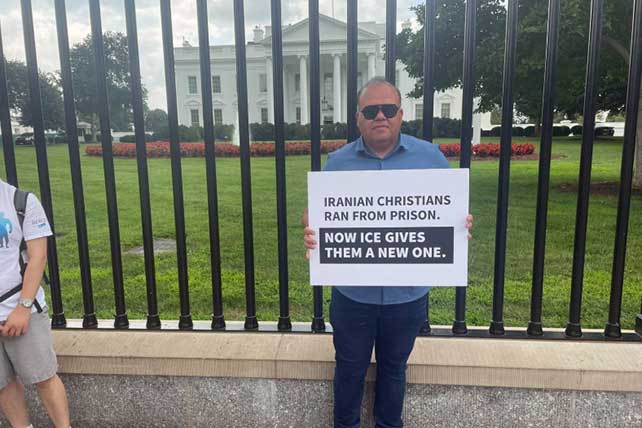WASHINGTON (RNS) — About a month ago, Pastor Ara Torosian received a frantic call from one of his congregants in Los Angeles. Armed authorities were at her door and trying to arrest her and her husband. He quickly rushed over to a scene that he described as akin to incidents in his native Iran.
The armed police were not the Islamic Revolutionary Guard Corps but United States Border Patrol federal agents. The congregants had fled Iran for the U.S., escaping persecution due to their Christian faith.
Now, the pastor of Cornerstone Church West LA — a multiethnic Protestant church that holds services in English, Spanish and Farsi — is protesting outside the White House, advocating not just for the five members of his own congregation who are still detained, but an estimated 200 Iranian Christians he said are currently in U.S. custody, according to his firsthand reports from detained immigrants. For three days, Torosian is refraining from eating solid food, drinking only water to draw attention to the issue.
RELATED: Most Immigrants Who Are Vulnerable to Trump’s Mass Deportation Policies Are Christians: Report
“I decided last week to come and to be a voice for voiceless people,” Torosian told RNS on Wednesday (July 23), adding he’s met with lawmakers and policy leaders during his visit. “There are lots of Iranian Christian people detained and they are in danger of deportation back to Iran. I came here to be their voice in front of the White House. … I just want people to hear what is in my heart, what’s happened to us and tell them to see it.”
Torosian’s congregants were detained in a wave of U.S. Immigration and Customs Enforcement arrests that targeted Iranian immigrants shortly after a ceasefire was declared between Israel and Iran after a 12-day war in June. The same week as Torosian’s congregants were taken by Border Patrol, at least 11 other Iranians were arrested across the country, according to a DHS statement.
Torosian said his congregants came as asylum-seekers under a Biden administration policy, followed all legal protocols and received work permits. One family, a couple and their 3-year-old daughter, was arrested during a scheduled immigration court appearance, while the couple he captured on video was at their home.
U.S. Border Patrol agents detain two Iranian Christian individuals, June 24, 2025, in Los Angeles. (Video screen grabs via Ara Torosian)
In the video Torosian recorded of the arrests, police can be heard saying CBP One, the mobile app the family used to legally come to the U.S. under the Biden administration, “is no longer valid anymore.” During the incident, the woman had a panic attack and was wrestled to the ground by police, which was captured on video.
“When I saw that scene, it triggered something inside of me, and I thought, ‘Where am I? Am I in LA or in the streets of Tehran?’” Torosian said.
The wife was later taken to the hospital, where Torosian said he was blocked by federal agents from praying with her, and then to an ICE detention center.
A spokesperson for U.S. Customs and Border Protection, which includes Border Patrol, said the couple were considered “subjects of national security interest” and were “unlawfully present” in the U.S., RNS previously reported.
Iran has so far refused to take deportees from the U.S.; however, last month the Supreme Court allowed the administration to deport migrants to countries that are not their homelands.
Were they to be deported back to Iran, they could face religious persecution. Open Doors International, an evangelical organization covering Christian persecution, in a January report listed Iran in the top 10 countries known for government oppression and persecution of Christians.
Despite being less than 1% of the population, Christians make up the largest non-Muslim religious minority in the Islamic Republic of Iran, according to Open Doors. Iranian state recognition has largely been restricted to historic ethnic churches such as the Armenian Apostolic Church, Assyrian Church of the East and Chaldean and Aramean churches. Christian worship in Farsi has been outlawed, and churches that cater to the historically Muslim, ethnically Persian majority are suppressed. Proselytizing and conversion are punishable by fines, corporal punishment, jail time and potentially the death penalty under Iranian law.
After facing threats, Torosian fled Iran in 2010 and is now an American citizen.
“I was caught smuggling Bibles in Iran, and (the police) said, ‘You are a spy of Israel, you’re a spy of America,’” Torosian recalled. “There’s long-term prison sentences, they kill our pastors and even in America, I got threatened by (the Iranian government) many times.”


